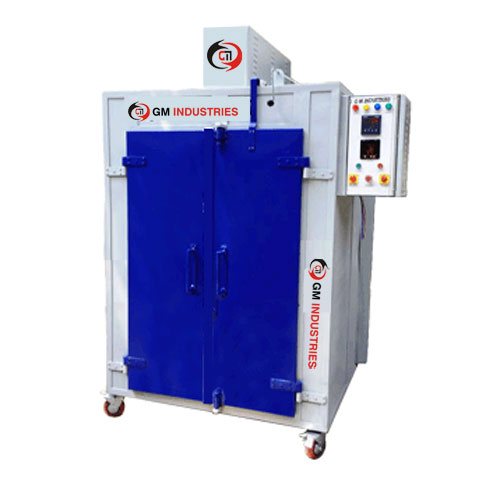Industrial Oven
What is an Industrial Oven?
An Industrial Oven is a heated enclosure that is utilized for various heat treatment processes. It operates at high temperatures and can be used for both small and large volume applications. GM Industries offers industrial oven models with temperatures up to 700°C and volumes up to over 13,000 liters, which can cater to different industrial applications and client requirements.
The most common heat sources for an industrial oven are hot water, gas, and electricity, which are usually introduced into the oven through forced convection. The design of GM Industries’ industrial oven is characterized by sturdy construction and durable materials, which enable the oven to run smoothly for heavy-duty applications. Each oven can be customized and equipped with a wide range of options, including over-temperature protection, loading and handling devices, or advanced temperature control systems.
Industrial ovens have various applications in industries such as aerospace, automotive, electronics, food processing, and pharmaceuticals. In the aerospace industry, industrial ovens are used for curing composites, while in the automotive industry, they are used for drying coatings or preheating parts before assembly. In the electronics industry, industrial ovens are used for soldering, curing, and annealing, and in the food processing industry, they are used for baking, cooking, and drying. In the pharmaceutical industry, industrial ovens are used for sterilizing and drying products.
GM Industries is a leading industrial oven manufacturer, and we offer a wide range of standard and customized models to meet the diverse needs of their customers. As a prominent industrial oven supplier, our industrial ovens are designed to provide precise temperature control, uniform heat distribution, and maximum efficiency, which ensures consistent quality and productivity in various industrial applications.
Industrial Oven Price
The industrial oven price in India offered by Industrial Oven manufacturers is listed below: –
| Product Range | Price |
| Industrial Oven | ₹ 2.50 Lakh / Unit |
(Prices shown above are provisional prices and may change due to different market conditions and requirements.)
For more information on any of our high quality products or getting accurate prices contact GM Industries at
Call Us
+(91)-9820533489 / 7738562224
Enquiry Form
Submit
How Does an Industrial Oven Work?
The working principle of an industrial oven involves the transfer of heat energy from a heat source to the materials being treated inside the oven. The heat source can be hot water, gas, or electricity, and it is introduced into the oven through forced convection. The heat energy is then distributed evenly throughout the oven using fans or blowers.
The materials being treated inside the oven are placed on trays or racks, and they absorb the heat energy, which causes them to undergo various heat treatment processes such as curing, baking, or drying. The temperature inside the oven is controlled using a temperature control system, which maintains a precise and uniform temperature throughout the oven.
During the heat treatment process, the materials inside the oven may release gases or vapours, which need to be extracted to prevent them from building up inside the oven. This is achieved through an exhaust system, which removes the gases and vapours and maintains a safe and clean environment inside the oven.
Overall, the working principle of an industrial oven is based on the transfer of heat energy from a heat source to the materials being treated inside the oven, while ensuring precise temperature control, uniform heat distribution, and efficient operation.
Advantages of Industrial Oven
There are several advantages of using an industrial oven for heat treatment processes:
Versatility
Industrial ovens are capable of performing a wide range of heat treatment processes such as drying, baking, curing, annealing, sterilizing, and more. This versatility makes them ideal for use in various industries such as aerospace, automotive, electronics, food processing, and pharmaceuticals.
Precise Temperature Control
Industrial ovens are equipped with temperature control systems that enable precise temperature control, ensuring that the materials being treated inside the oven are heated uniformly and to the required temperature.
Uniform Heat Distribution
Industrial ovens are designed to distribute heat evenly throughout the oven, ensuring that the materials being treated receive consistent heat treatment, which results in consistent quality and productivity.
Increased Efficiency
Industrial ovens are designed to operate efficiently, which helps to reduce operating costs and increase productivity. They can also be customized with advanced features such as automatic loading and unloading systems, conveyor systems, and temperature profiling systems, which further enhance their efficiency.
Safety
Industrial ovens are designed with safety in mind, with features such as over-temperature protection, exhaust systems, and safety interlocks, which help to ensure that the oven operates safely and meets all safety regulations.
Overall, the advantages offered by industrial oven suppliers make them an indispensable tool for various industries that require precise and efficient heat treatment processes.
Applications of Industrial Oven
Industrial oven uses across various industries includes:
- Aerospace Industry: Industrial ovens are used in the aerospace industry for curing composite materials used in aircraft construction. They are also used for heat treating metal components and parts.
- Automotive Industry: Industrial ovens are used in the automotive industry for drying coatings on parts and for preheating parts before assembly.
- Electronics Industry: Industrial ovens are used in the electronics industry for soldering, curing, and annealing electronic components.
- Food Processing Industry: Industrial ovens are used in the food processing industry for baking, cooking, and drying food products.
- Pharmaceutical Industry: Industrial ovens are used in the pharmaceutical industry for sterilizing and drying products.
- Chemical Industry: Industrial ovens are used in the chemical industry for drying, curing, and calcining various chemical products.
- Plastics Industry: Industrial ovens are used in the plastics industry for drying, curing, and annealing plastic products.
- Textile Industry: Industrial ovens are used in the textile industry for drying, curing, and finishing fabrics.
Overall, the applications of industrial ovens are diverse, and they are widely used in industries that require precise and efficient heat treatment processes. The versatility of industrial ovens makes them an indispensable tool for various applications, and their advanced features and customization options allow them to be tailored to meet specific industry requirements.

How do I choose an Industrial Oven?
If you are in the market for an industrial oven, GM Industries can help you find the right oven for your specific application. GM Industries is a leading industrial oven manufacturers in India with expertise and experience in the industry. We can guide you through the selection process and help you choose an oven that meets your requirements for temperature range, volume, and functionality. We offer a wide range of industrial oven models with various options and features to suit your needs, and we can customize an oven to meet your unique requirements. Additionally, our commitment to quality and customer satisfaction ensures that you will receive a high-quality oven that will provide years of reliable service. Contact the most trusted industrial oven manufacturers in Mumbai today to discuss your industrial oven needs and to learn how we can help you find the right oven for your application.
Frequently Asked Questions
An industrial oven is a heated chamber used for various heat treatment processes, operating at high temperatures with precise temperature control.
Industrial ovens are used in a wide range of industries, including aerospace, automotive, electronics, food processing, pharmaceuticals, chemical, plastics, and textiles.
The temperature range of an industrial oven can vary depending on the model and application, but it can go up to 700°C or higher.
The capacity of an industrial oven can range from small lab ovens to large ovens with volumes over 13,000 liters.
The most common heating sources for industrial ovens are gas, electricity, and hot water.
Heat is distributed inside an industrial oven through convection, radiation, or a combination of both.
Industrial ovens are used in the aerospace industry for curing composite materials and heat treating metal components and parts.
Industrial ovens are used in the automotive industry for drying coatings on parts and preheating parts before assembly.
Industrial ovens are used in the electronics industry for soldering, curing, and annealing electronic components.
Industrial ovens are used in the food processing industry for baking, cooking, and drying food products.
Industrial ovens are used in the pharmaceutical industry for sterilizing and drying products.
Industrial ovens are used in the chemical industry for drying, curing, and calcining various chemical products.
Industrial ovens are used in the plastics industry for drying, curing, and annealing plastic products.
Industrial ovens are used in the textile industry for drying, curing, and finishing fabrics.
A batch oven is designed for small to medium-sized production runs, while a conveyor oven is designed for high-volume production.
A tunnel oven is a continuous process oven, while a batch oven is a batch process oven.
Yes, industrial ovens can be customized with various options and features to meet specific requirements.
Safety features for industrial ovens include over-temperature protection, exhaust systems, and safety interlocks.
Choosing the right industrial oven depends on factors such as the required temperature range, volume, and functionality for your specific application. Consult with an industrial oven manufacturer or supplier for guidance in selecting the right oven for your needs.
